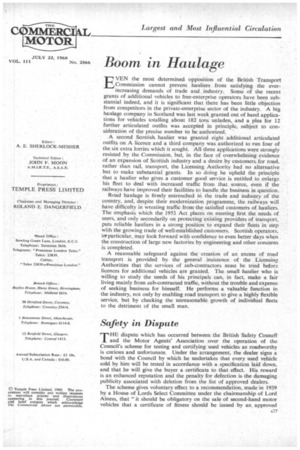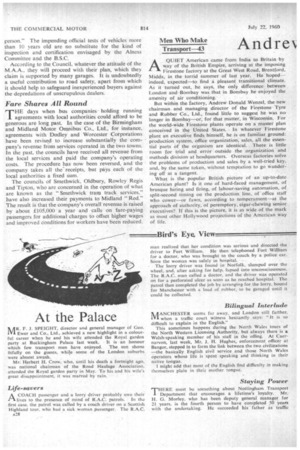Boom in Haulage
Page 29

Page 30

If you've noticed an error in this article please click here to report it so we can fix it.
EVEN the most determined opposition of the British Transport Commission cannot prevent hauliers from satisfying the everincreasing demands of trade and., industry. Some of the recent grants of additional vehicles to free-enterprise operators have been substantial indeed, and it is significant that there has been little objection from competitors in the private-enterprise sector of the industry. A big haulage company in Scotland was last week granted out of hand applications for vehicles totalling about 182 tons unladen, and a plea for 12 further articulated outfits was accepted in principle, subject to consideration of the precise number to be authorized.
A second Scottish. haulier was granted eight additional articulated outfits on A licence and a third company was authorized to run four of the six extra lorries which it sought. All three applications were strongly resisted by the Commission, but, in the face of overwhelming evidence of an expansion of Scottish industry and a desire by customers for road, rather than rail, transport, the Licensing Authority had no alternative but to make substantial grants. In so doing he upheld the principle that a haulier who gives a customer good service is entitled to enlarge his fleet to deal with increased traffic from that source, even if the railways have improved their facilities to handle the business in question.
Road haulage is firmly entrenched in the trade and industry of the country, and, despite their modernization programme, the railways will have difficulty in wresting traffic from the satisfied customers of hauliers. The emphasis which the 1953 Act places on meeting first the needs of users, and only secondarily on protecting existing providers of transport, puts reliable hauliers in a strong position to expand their fleets in step with the growing trade of well-established customers. Scottish operators, itt particular, may look forward with confidence to even better days when the construction of large new factories by engineering and other concerns is completed.
A reasonable safeguard against the creation of an excess of road transport is provided by the general insistence of the Licensing Authorities that the services of sub-contractors must be tried before licences for additional vehicles are granted. The small haulier who is willing to study the needs of his principals can, in fact, make a fair living mainly from sub-contracted traffic, without the trouble and expense of seeking business for himself. He performs a valuable function in the industry, not only by enabling road transport to give a highly flexible service, but by checking the unreasonable growth of individual fleets to the detriment of the small man.
Safety in Dispute
THE dispute which has occurred between the British Safety Council and the Motor Agents' Association over the operation of the Council's scheme for testing and certifying used vehicles as roadworthy is curious and unfortunate. Under the arrangement, the dealer signs a bond with the Council by which he undertakes that every used vehicle sold by him will be tested in accordance with a specification laid down, and that he will give the buyer a certificate to that effect. His reward is an enhanced reputation and the penalty for defection is the damaging publicity associated with deletion from the list of approved dealers.
The scheme gives voluntary effect to a recommendation, made in 1939 by a House of Lords Select Committee under the chairmanship of Lord Alness, that "it should be obligatory on the sale of second-hand motor vehicles that a certificate of fitness should be issued by an approved person." The impending official tests of vehicles more than 10 years old are no substitute for the kind of inspection and certification envisaged by the Alness Committee and the B.S.C.
According to the Council, whatever the attitude of the M.A.A., they will proceed with their plan, which they claim is supported by many garages. It is undoubtedly a useful contribution to road safety, apart from which it should help to safeguard inexperienced buyers against the depredations of unscrupulous dealers.
Fare Shares All Round
THE days when bus companiesholding running agreements with local authorities could afford to be generous are long past. In the case of the Birmingham and Midland Motor Omnibus Co., Ltd., for instance, agreements with Dudley and Worcester Corporations have been revised to increase substantially the company's revenue from services operated in the two towns. In the past, the councils have received all revenue from the local services and paid the company's operating costs. The procedure has now been reversed, and the company takes all the receipts, but pays each of the local authorities a fixed sum.
The councils of Smethwick, Oldbury, Rowley Regis and Tipton, who are concerned in the operation of what are known as the " Smethwick tram track services," have also increased their payments to Midland "Red." The result is that the company's overall revenue is raised by about £105,000 a year and calls on fare-paying passengers for additional charges to offset higher wages and improved conditions for workers have been reduced.




































































































